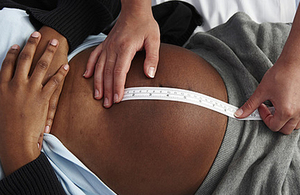Rubella susceptibility screening in pregnancy to end in England
Public Health England will end rubella (German measles) susceptibility screening in pregnancy in England on 1 April 2016.

Public Health England (PHE) has today (27 January 2016) announced that rubella (German measles) susceptibility screening in pregnancy will end in England on 1 April 2016.
The decision to stop screening follows a review of evidence by the UK National Screening Committee (UK NSC) in 2003 and 2012.
On both occasions the Committee found that screening for rubella susceptibility during pregnancy no longer met the criteria for a screening programme and should be discontinued because:
- rubella infection levels in the UK are so low they are defined as eliminated by the World Health Organization
- rubella infection in pregnancy is very rare
- being fully immunised with the measles, mumps and rubella (MMR) vaccine before becoming pregnant is more effective in protecting women against rubella in pregnancy
- the screening test used can potentially give inaccurate results and cause unnecessary stress among women
Currently rubella susceptibility screening consists of a blood test offered to all pregnant women to establish whether they are immune to rubella. Most women are immune and no further action is required.
Women who are not immune are advised to avoid contact with the virus and offered the measles, mumps and rubella (MMR) vaccination after the birth of the baby, before any further pregnancies.
The decision to end screening for rubella susceptibility in pregnancy has been made possible by the high levels of vaccination rates achieved through the MMR immunisation programme. Figures in England during 2014 and 2015 show that 91.5% of children aged up to 2 years had received at least one MMR vaccination; with 94.5% having received at least 1 dose of MMR by 5 years.
Dr Anne Mackie, Director of Screening Programmes at PHE said:
The decision to end rubella susceptibility screening in pregnancy in England is based on a rigorous assessment of the evidence and expert clinical advice. A major factor is that high uptake of the MMR vaccine in children means that rubella infection is considered to be eliminated in the UK by the World Health Organization. The change will free up busy midwives so they can spend more time looking after a new mother and her baby.
Screening for rubella in pregnancy does not give any protection to the unborn baby in that pregnancy. The best preventative measure a woman can take to protect herself from rubella is to ensure she is immunised with the MMR vaccine before she gets pregnant.
Dr Mary Ramsay, Head of Immunisation at PHE said:
The high uptake rates of MMR in children in England, which are close to the World Health Organization’s target of 95%, means that rubella infection is now very uncommon in this country.
Although most UK pregnant women have themselves been vaccinated with a rubella containing vaccine, sustaining high coverage in younger children will reduce the risk of any unprotected women becoming infected and passing this to their unborn child.
Although rubella is uncommon here, the condition is still widespread in many parts of the world, such as Africa and Asia. If you’re a new entrant to the UK, register with a GP and ask for the MMR. If you’re planning to travel outside of the UK it’s also worth checking if you are up to date with your GP.
It is possible to have the MMR vaccination at any age, so if you suspect that you, or your children, are not up-to-date with your MMR, contact your GP.
Appropriate training and education will be given to increase the knowledge of professional healthcare workers which will enable them to encourage pregnant women to be ‘rash aware’ and to seek urgent medical attention if there is any concern.
PHE offers the following advice to women on the MMR vaccination:
If you are planning a pregnancy:
- your MMR status should be checked at appropriate opportunities, for example when you register with a new GP, attend a family planning clinic or travel abroad
- you should receive the vaccine before trying for a baby; 2 doses will also give protection against mumps and measles
Measles can also be serious in pregnancy, sometimes leading to miscarriage, stillbirth or premature birth. If you are not sure whether you are vaccinated, having another MMR vaccine prior to becoming pregnant will not cause harm.
If you are already pregnant and not up-to-date with the MMR vaccination, or you’re unsure:
- speak to your GP or your midwife when you discuss the whooping cough and influenza vaccines
- the MMR vaccine should be given soon after you give birth which will help protect you and your family against future measles, mumps and rubella
- the MMR vaccine can be given to breastfeeding mothers without any risk to their baby
Background information
-
Public Health England exists to protect and improve the nation’s health and wellbeing and reduce health inequalities. It does this through world-class science, knowledge and intelligence, advocacy, partnerships and the delivery of specialist public health services. PHE is an operationally autonomous executive agency of the Department of Health. Follow us on Twitter: @PHE_uk, and Facebook: www.facebook.com/PublicHealthEngland.
-
In England, the MMR vaccine is part of the routine childhood immunisation programme, offered at 12 and 13 months with a second booster dose given before school, usually between 3 and 4 years old. For further information see NHS Choices.
-
Read the last UK NSC recommendation on rubella susceptibility screening in pregnancy (May 2012).
UKHSA press office: screening